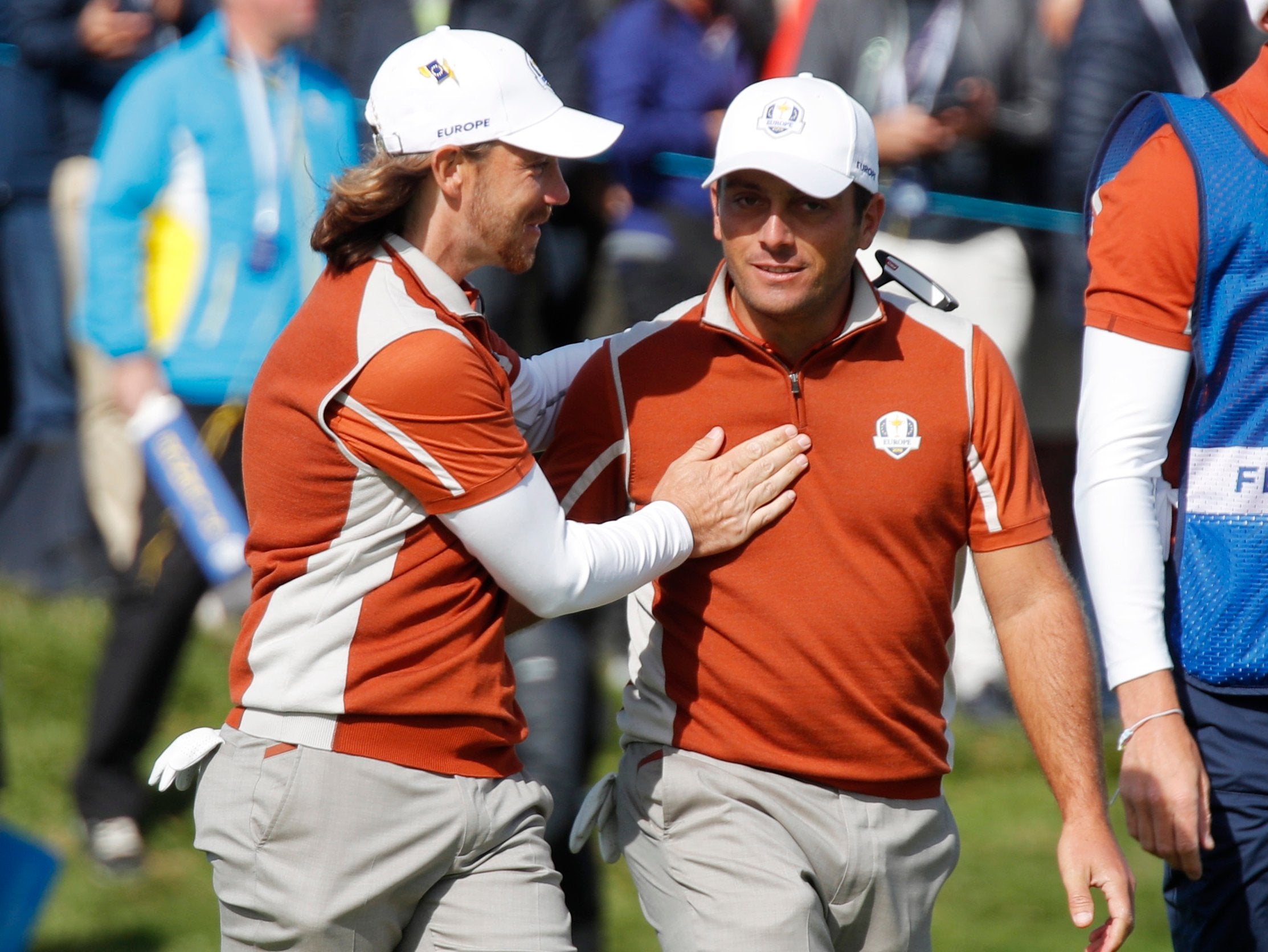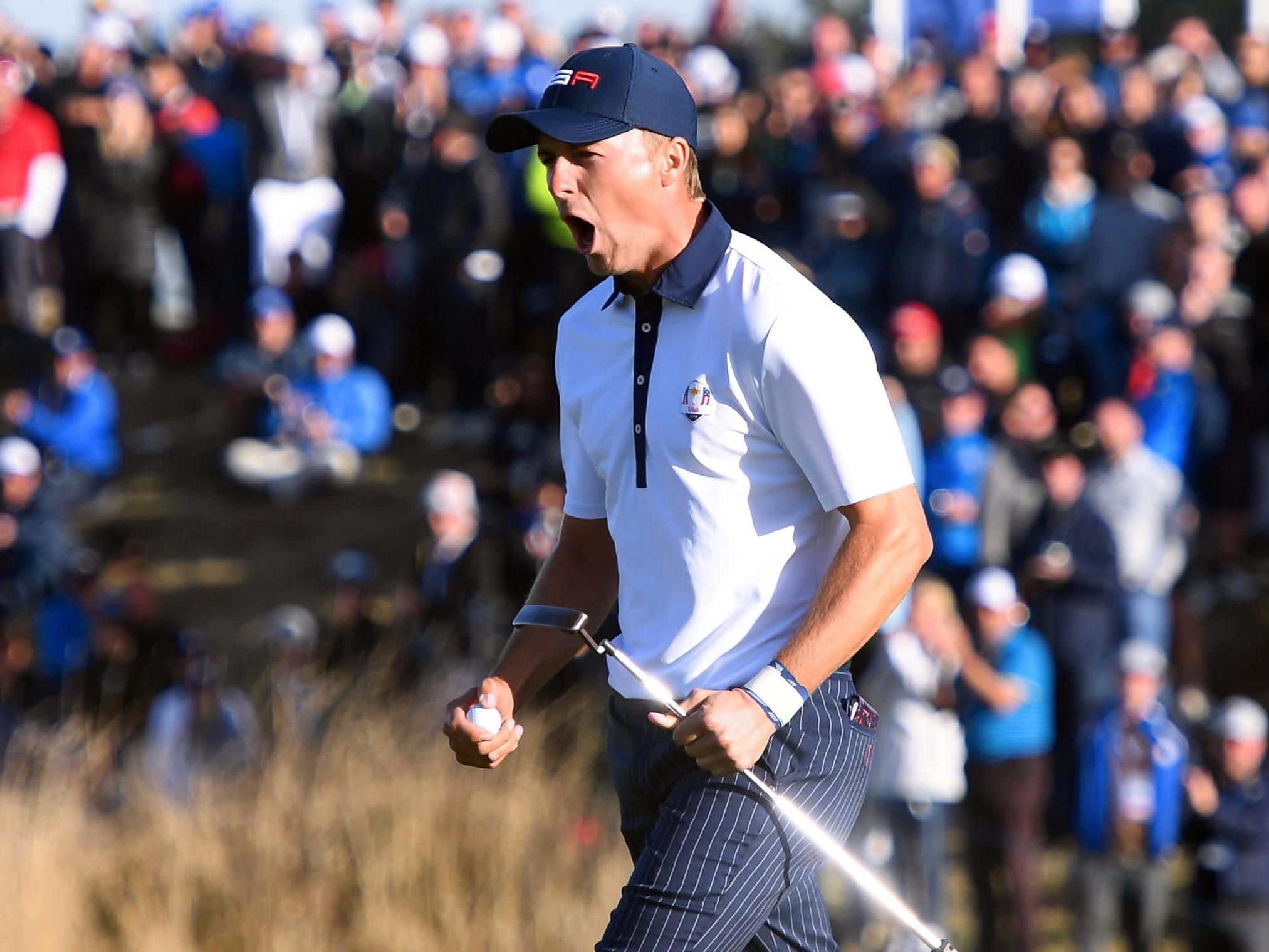Ryder Cup 2018: Europe are rightly favourites but this is the Sunday singles, the Twilight Zone of sport
A Sunday at the Ryder Cup is one of those rare occasions that can be swayed by the flap of a butterfly’s wings, a day when the normal rules do not necessarily apply

Your support helps us to tell the story
From reproductive rights to climate change to Big Tech, The Independent is on the ground when the story is developing. Whether it's investigating the financials of Elon Musk's pro-Trump PAC or producing our latest documentary, 'The A Word', which shines a light on the American women fighting for reproductive rights, we know how important it is to parse out the facts from the messaging.
At such a critical moment in US history, we need reporters on the ground. Your donation allows us to keep sending journalists to speak to both sides of the story.
The Independent is trusted by Americans across the entire political spectrum. And unlike many other quality news outlets, we choose not to lock Americans out of our reporting and analysis with paywalls. We believe quality journalism should be available to everyone, paid for by those who can afford it.
Your support makes all the difference.“I’m a big believer in fate, and I have a good feeling about this,” Ben Crenshaw announced to the packed press conference room on the Saturday evening at Brookline in 1999. There was a bit of a titter, but nobody really thought much more of it. After all, when your team is 10-6 down after two days of the Ryder Cup, it doesn’t really matter what you have to say about it. Crenshaw was toast and so, collectively, were the United States.
“Remember one thing: all men die, but not all men truly live,” Jose Maria Olazabal told his battered European team on the Saturday evening at Medinah in 2012. “I want every one of you to go out there tomorrow and live as if it’s your last day.” Again, his European side were 10-6 down after two days, away from home. Olazabal seemed destined to be remembered as the confused captain who tossed away the Ryder Cup and then quoted the film Braveheart in an attempt to remedy things.
But both Crenshaw and Olazabal knew something the rest of us didn’t. Sunday at the Ryder Cup is a strange and mercurial beast. In many ways, it’s the Twilight Zone of sport, a day when the normal rules do not necessarily apply. A day that messes with men’s heads. And it’s why, even after being soundly outplayed for four sessions, the United States can still win this. They probably won’t. But they might. But it’s likely they won’t. But they’ve probably got a better chance of doing it than you think.
Let’s make the case against first. There’s a persistent myth that the USA invariably sweep the singles matches. In fact, they’ve won three out of the last eight. In addition, the course is still just the same course they have been summarily failing on for the last two days. The fairways are just as narrow, the rough just as thick, the premium on long and medium iron play just as crucial. Europe do not look like a team on the verge of collapse. Only poor Thorbjorn Olesen, who was lumbered with a off-colour Rory McIlroy on the first morning, not picked again and now has to negotiate Jordan Spieth on Sunday, stands out as a weak link.
But here’s the counterpoint: this is one of those days when logic impinges only obliquely. Players who have looked rock solid all week can suddenly flounder when thrown out on their own, and vice versa. How will Francesco Molinari and Tommy Fleetwood cope now their outrageously successful partnership has been severed? Do you really dare count out Tiger Woods in a one-on-one battle? Of golf? Man for man, the United States are simply a better team than Europe. Not much, but then one hole in 18 is the only margin you need. An American team widely lauded as one of the greatest ever to leave their shores will finally need to start showing it.
The evidence of the last few sessions suggests that momentum and the early advantage will be all-important. Not since Friday morning has a pair won the match having trailed after nine holes. Every foursomes match on Saturday afternoon was won by a comfortable margin. These are, after all, two extremely tired teams, 17 of whom were at the Tour Championship last Sunday. These are frazzled minds running on fumes, trying to eke one last effort out of themselves. Once the momentum shifts, it can shift in a very big way.

This tallies with the historical evidence, too. In 10 of the last 12 Ryder Cups, the margin of singles victory has been three points or more - that is, 7½-4½ or greater. America need just eight to retain the Cup. An early sea of red will put fright into European hearts, and US captain Jim Furyk’s decision to pack the middle of the draw - Dustin Johnson, Spieth and Rickie Fowler is about as powerful a middle order as you could hope for - has the potential to keep the destiny of the Cup in the balance until late on Sunday.
Furyk’s opposite number Thomas Bjorn has, at least, avoided the grave blunder that Mark James made at Brookline in 1999, sending out three of his unplayed rookies - Jarmo Sandelin, Jean van de Velde and Andrew Coltart - in his first five. They were matched against Woods, Phil Mickelson and Davis Love III, and all were predictably hammered. Instead, Bjorn has opted to spread his risk, leading with the experience of Rory McIlroy, Paul Casey and Justin Rose.
It is a calculated gamble, given that a few early points on the board would essentially seal the Cup for Europe, but if Europe’s veterans misfire then the denouement could get extremely tight. Players who play the first four sessions have a losing record in the singles, which suggests that McIlroy, Molinari and Fleetwood could struggle. Players who have only played once have an even worse record, which is why Mickelson and Olesen won’t be attracting too much money.

And that’s before you throw in the X-factors, the wild card events that could have every significance or none. To what extent were Europe fuelled at Medinah in 2012 by the urge to honour the memory of Seve Ballesteros? Did McIlroy’s mad dash to the first tee after oversleeping give him that extra little burst of energy? To what extent were America inspired in 1999 by Crenshaw’s decision to invite his friend the governor of Texas - a man named George W Bush - to read out a letter written by a colonel at the Battle of the Alamo? Impossible to say, of course, but in a tussle where emotion is never far from the surface, it’s hard to understate the role of feeling, of presentiment, of the tiny intangibles that can create the extraordinary out of the ordinary.
Almost everything will need to go right for America to win. Only a few need to go right for Europe. This is why the home side remain justifiable favourites, and yet on a day of high nerves and unknowable caprice, the improbable can seem strangely probable. Whether it’s exhaustion, presentiment or the oeuvre of Mel Gibson, Sunday at the Ryder Cup feels like one of those occasions that can be swayed by the flap of a butterfly’s wings.
Join our commenting forum
Join thought-provoking conversations, follow other Independent readers and see their replies
Comments